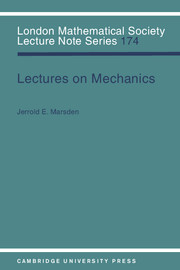Book contents
Preface
Published online by Cambridge University Press: 05 August 2012
Summary
Many of the greatest mathematicians — Euler, Gauss, Lagrange, Riemann, Poincaré, Hilbert, Birkhoff, Atiyah, Arnold, Smale — were well versed in mechanics and many of the greatest advances in mathematics use ideas from mechanics in a fundamental way. Why is it no longer taught as a basic subject to mathematicians?
AnonymousI venture to hope that my lectures may interest engineers, physicists, and astronomers as well as mathematicians. If one may accuse mathematicians as a class of ignoring the mathematical problems of the modern physics and astronomy, one may, with no less justice perhaps, accuse physicists and astronomers of ignoring departments of the pure mathematics which have reached a high degree of development and are fitted to render valuable service to physics and astronomy. It is the great need of the present in mathematical science that the pure science and those departments of physical science in which it finds its most important applications should again be brought into the intimate association which proved so fruitful in the work of Lagrange and Gauss.
Felix Klein, 1896These lectures cover a selection of topics from recent developments in the geometric approach to mechanics and its applications. In particular, we emphasize methods based on symmetry, especially the action of Lie groups, both continuous and discrete, and their associated Noether conserved quantities veiwed in the geometric context of momentum maps. In this setting, relative equilibria, the analogue of fixed points for systems without symmetry are especially interesting. In general, relative equilibria are dynamic orbits that are also group orbits.
Information
- Type
- Chapter
- Information
- Lectures on Mechanics , pp. ix - xiiPublisher: Cambridge University PressPrint publication year: 1992
